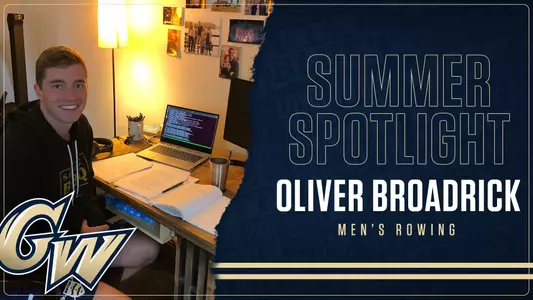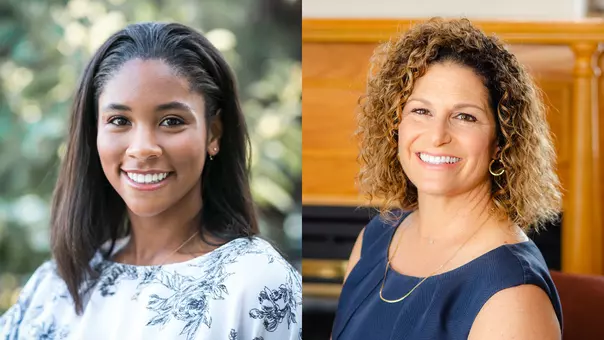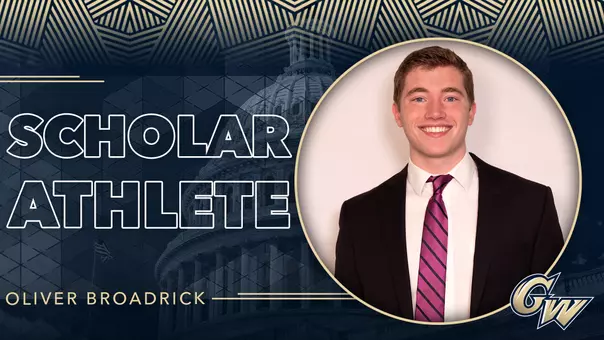George Washington University Athletics

Summer Spotlight: Oliver Broadrick of Men's Rowing
8/25/2020 10:00:00 AM | Men's Rowing, Student-Athlete Development
Rower's research aims to improve certification of election outcomes
Never before much involved in politics, Oliver Broadrick is excited for the countdown to the November elections.
Broadrick, a rising junior with GW men's rowing, is part of a research team within the Department of Computer Science focused on election security.
Since the spring, the Massachusetts native has been working under the direction of Prof. Poorvi Vora to design software to conduct risk-limiting ballot polling audits more efficiently.
Vora's group, which is comprised of a handful of GW Computer Science students as well as professionals in Poland and Colorado, published a paper earlier this month about a new type of risk-limiting audit, known as the ATHENA class, that computes risk levels more accurately than currently-used techniques. The goal is to put the new software into action this fall to help election officials in some areas certify outcomes.
As GW Athletics gears up for Election Day 2020 with its #OnlyatGW Voting Initiative, Broadrick is embracing his #OnlyatGW research opportunity that could help make the process go more smoothly around the country.
"It definitely feels very exciting," Broadrick said. "I didn't expect, as an undergraduate, to be working on a research project, especially doing work like this."
Initially, it was the math that drew Broadrick to the project.
Broadrick joined the group after taking a Computer Science course taught by Vora called Discrete Structures II last fall. At the end of the semester, he approached his professor about other courses to continue studying similar material, and she invited him to be part of her research team.
Risk-limiting audits provide a way to certify electronic election results with statistical confidence without manually counting every ballot. They do this by comparing a sample of hand-counted ballots vs. the computer tally.
With Vora serving as a mentor, Broadrick has taken on the challenge, poring through research papers to build his understanding of a complex topic that combines statistics, computer programming and policy.
"I really didn't know anything about it," Broadrick said. "It's more of a math problem and then software than it is political, but I have definitely learned a lot about different methods of voting and different methods of auditing elections."
Broadrick earned three credits for his research during the spring semester and then continued with the team this summer. He meets with Vora weekly via video conferencing, but a majority of the work is done on his own – crunching numbers and writing code.
Most of his research has focused on stratified audits, which take into account samples from several different jurisdictions, such as a statewide election.
"The nature of the work is that sometimes you have to spend a lot of time to make a very little bit of progress or no progress at all seemingly, but sometimes you come to a sudden new understanding of a problem and accomplish much more" Broadrick said.
Post-election audits are important to ensuring election integrity, and the science continues to evolve with the goal of certifying winners with confidence as quickly as possible.
In November 2017, Colorado became the first state to conduct a statewide risk-limiting audit. Now, four states – Colorado, plus Nevada, Rhode Island and Virginia – require them, while several others offer them as an option for local jurisdictions to confirm their results.
Broadrick never expected to be part of finding a solution, but he's excited to continue his work into the fall. Hopefully, he'll see his hard work make a difference on Election Day.
"Obviously going to GW, I know a lot of people who are more involved in politics than me," Broadrick said. "It's definitely cool that this application of the math in (Computer Science) that I'm interested in is directly applicable to something this relevant."
Broadrick, a rising junior with GW men's rowing, is part of a research team within the Department of Computer Science focused on election security.
Since the spring, the Massachusetts native has been working under the direction of Prof. Poorvi Vora to design software to conduct risk-limiting ballot polling audits more efficiently.
Vora's group, which is comprised of a handful of GW Computer Science students as well as professionals in Poland and Colorado, published a paper earlier this month about a new type of risk-limiting audit, known as the ATHENA class, that computes risk levels more accurately than currently-used techniques. The goal is to put the new software into action this fall to help election officials in some areas certify outcomes.
As GW Athletics gears up for Election Day 2020 with its #OnlyatGW Voting Initiative, Broadrick is embracing his #OnlyatGW research opportunity that could help make the process go more smoothly around the country.
"It definitely feels very exciting," Broadrick said. "I didn't expect, as an undergraduate, to be working on a research project, especially doing work like this."
Initially, it was the math that drew Broadrick to the project.
Broadrick joined the group after taking a Computer Science course taught by Vora called Discrete Structures II last fall. At the end of the semester, he approached his professor about other courses to continue studying similar material, and she invited him to be part of her research team.
Risk-limiting audits provide a way to certify electronic election results with statistical confidence without manually counting every ballot. They do this by comparing a sample of hand-counted ballots vs. the computer tally.
With Vora serving as a mentor, Broadrick has taken on the challenge, poring through research papers to build his understanding of a complex topic that combines statistics, computer programming and policy.
"I really didn't know anything about it," Broadrick said. "It's more of a math problem and then software than it is political, but I have definitely learned a lot about different methods of voting and different methods of auditing elections."
Broadrick earned three credits for his research during the spring semester and then continued with the team this summer. He meets with Vora weekly via video conferencing, but a majority of the work is done on his own – crunching numbers and writing code.
Most of his research has focused on stratified audits, which take into account samples from several different jurisdictions, such as a statewide election.
"The nature of the work is that sometimes you have to spend a lot of time to make a very little bit of progress or no progress at all seemingly, but sometimes you come to a sudden new understanding of a problem and accomplish much more" Broadrick said.
Post-election audits are important to ensuring election integrity, and the science continues to evolve with the goal of certifying winners with confidence as quickly as possible.
In November 2017, Colorado became the first state to conduct a statewide risk-limiting audit. Now, four states – Colorado, plus Nevada, Rhode Island and Virginia – require them, while several others offer them as an option for local jurisdictions to confirm their results.
Broadrick never expected to be part of finding a solution, but he's excited to continue his work into the fall. Hopefully, he'll see his hard work make a difference on Election Day.
"Obviously going to GW, I know a lot of people who are more involved in politics than me," Broadrick said. "It's definitely cool that this application of the math in (Computer Science) that I'm interested in is directly applicable to something this relevant."
Players Mentioned
GW Men's Rowing: This is Not the End
Tuesday, June 29
IRA Training
Tuesday, May 28
2019 Men's Rowing Eastern Sprints
Friday, May 17
Beyond the Buff and Blue: Bob Hobert
Friday, May 10













